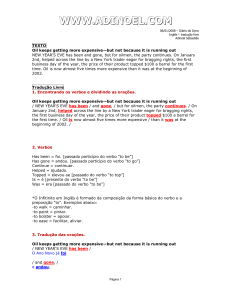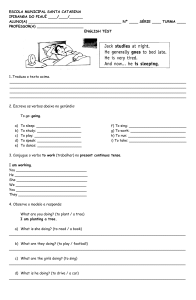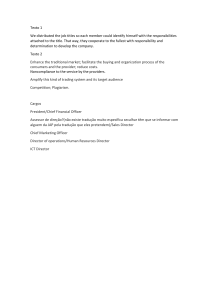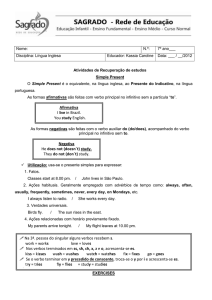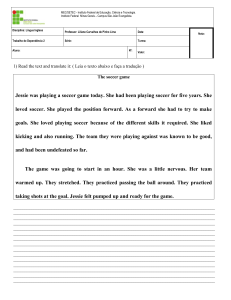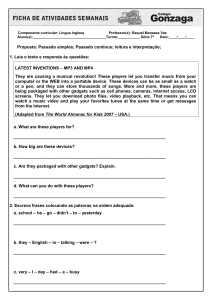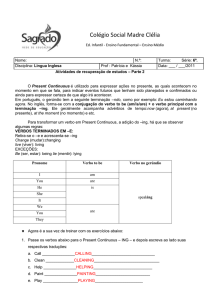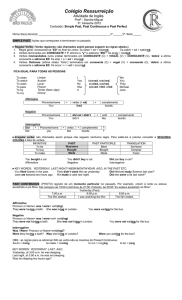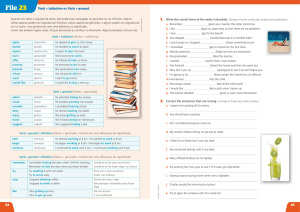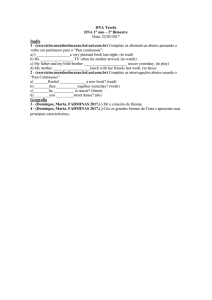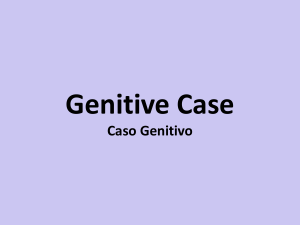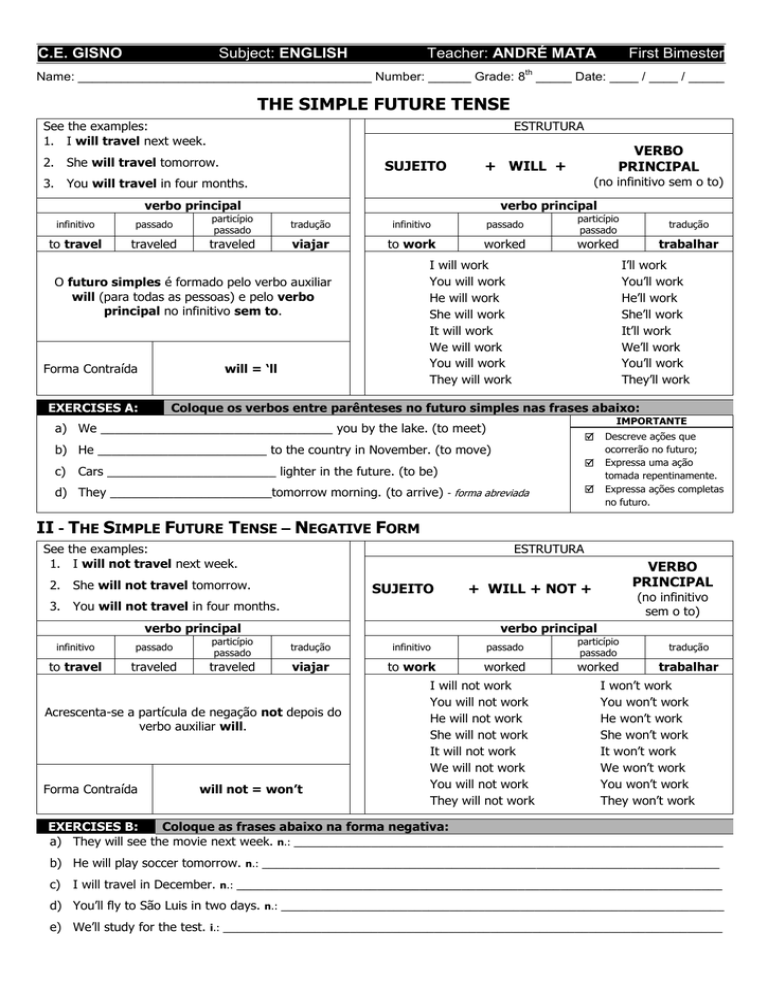
C.E. GISNO
Subject: ENGLISH
Teacher: ANDRÉ MATA
First Bimester
th
Name: _________________________________________ Number: ______ Grade: 8 _____ Date: ____ / ____ / _____
THE SIMPLE FUTURE TENSE
See the examples:
1. I will travel next week.
ESTRUTURA
2. She will travel tomorrow.
SUJEITO
VERBO
PRINCIPAL
+ WILL +
(no infinitivo sem o to)
3. You will travel in four months.
verbo principal
infinitivo
passado
particípio
passado
to travel
traveled
traveled
verbo principal
tradução
infinitivo
passado
particípio
passado
tradução
viajar
to work
worked
worked
trabalhar
I will work
You will work
He will work
She will work
It will work
We will work
You will work
They will work
O futuro simples é formado pelo verbo auxiliar
will (para todas as pessoas) e pelo verbo
principal no infinitivo sem to.
Forma Contraída
EXERCISES A:
will = ‘ll
I’ll work
You’ll work
He’ll work
She’ll work
It’ll work
We’ll work
You’ll work
They’ll work
Coloque os verbos entre parênteses no futuro simples nas frases abaixo:
IMPORTANTE
a) We _________________________________ you by the lake. (to meet)
b) He ________________________ to the country in November. (to move)
c) Cars ________________________ lighter in the future. (to be)
d) They _______________________tomorrow morning. (to arrive) - forma abreviada
Descreve ações que
ocorrerão no futuro;
Expressa uma ação
tomada repentinamente.
Expressa ações completas
no futuro.
II - THE SIMPLE FUTURE TENSE – NEGATIVE FORM
See the examples:
1. I will not travel next week.
ESTRUTURA
2. She will not travel tomorrow.
SUJEITO
VERBO
PRINCIPAL
+ WILL + NOT +
(no infinitivo
sem o to)
3. You will not travel in four months.
verbo principal
infinitivo
passado
particípio
passado
to travel
traveled
traveled
verbo principal
tradução
infinitivo
passado
particípio
passado
tradução
viajar
to work
worked
worked
trabalhar
Acrescenta-se a partícula de negação not depois do
verbo auxiliar will.
Forma Contraída
will not = won’t
I will not work
You will not work
He will not work
She will not work
It will not work
We will not work
You will not work
They will not work
I won’t work
You won’t work
He won’t work
She won’t work
It won’t work
We won’t work
You won’t work
They won’t work
EXERCISES B:
Coloque as frases abaixo na forma negativa:
a) They will see the movie next week. n.: _____________________________________________________________
b) He will play soccer tomorrow. n.: _________________________________________________________________
c) I will travel in December. n.: _____________________________________________________________________
d) You’ll fly to São Luis in two days. n.: _______________________________________________________________
e) We’ll study for the test. i.: _______________________________________________________________________
-2-
C.E. GISNO – 8th grade – 1st bimester
English Class – The Simple Future Tense
III - THE SIMPLE FUTURE TENSE – INTERROGATIVE FORM
See the examples:
1. Will I travel next week?
ESTRUTURA
2. Will she travel tomorrow?
WILL
VERBO
PRINCIPAL
+ SUJEITO +
(no infinitivo
sem o to)
3. Will you travel in four months?
verbo principal
verbo principal
infinitivo
passado
particípio
passado
to travel
traveled
traveled
tradução
infinitivo
passado
particípio
passado
tradução
viajar
to work
worked
worked
trabalhar
Will
Will
Will
Will
Will
Will
Will
Will
Coloca-se o verbo auxiliar will antes do sujeito.
EXERCISES C:
I work?
you work?
he work?
she work?
it work?
we work?
you work?
they work?
Coloque as frases abaixo na forma interrogativa:
a) They will see the movie next week. i.: _____________________________________________________________
b) He will play soccer tomorrow. i.: __________________________________________________________________
c) I will travel in December. i.: _____________________________________________________________________
d) You’ll fly to Salvador in two days. i.: _______________________________________________________________
e) We’ll study for the test. i.: _______________________________________________________________________
ADVÉRBIOS - O futuro simples geralmente é acompanhado de advérbios de tempo no fim da frase:
1. tomorrow
2. later
day
week
weekend
month
year
day
week
weekend
month
year
4. next
No fim da
frase
6. the following
EXERCISES D:
3. soon
5. in two (two, three, four…)
days
weeks
months
years
Coloque os verbos entre parênteses no futuro simples nas frases abaixo:
1) You ________________________________ the book which you need. (to find)
2) He_________________________________ you tomorrow (to call)
3) She ______________________________ me with the English (to help)
EXERCISES E:
Coloque as frases abaixo nas formas negativa e interrogativa:
1) She will meet you at home.
2) I’ll work hard tomorrow.
n.:
_________________________________________________________________
i.:
_________________________________________________________________
n.:
_________________________________________________________________
i.:
________________________________________________________________
Prof. André Mata – E-MAIL: [email protected]
-2-
BLOG: andrematta.blogspot.com
C.E. GISNO – 8th grade – 1st bimester
-3-
English Class – The Simple Future Tense
Leia o texto abaixo e responda as questões de A a F
A) Combine as colunas adequadamente
com base no significado das palavras:
ONE DAY
1
One day I will go to Brazil. I will visit
( 1 ) about
(
) pessoas
the North and the South. I will eat typical
( 2 ) beach
(
) aprender
( 3 ) country
(
) sobre, a respeito
( 4 ) eat
(
) como, tais como
( 5 ) learn
(
) fazer
( 6 ) like
(
) lugar
( 7 ) make
(
) maravilhoso
( 8 ) people
(
) país
( 9 ) place
(
) praia
will love this country located in South
( 10 ) wonderful
(
) comer
America. I will see wonderful beaches and I
B) De acordo com o texto, escreva certo (C)
ou errado (E) em cada frase a baixo:
food, like “feijoada” and “acarajé”. I will talk
4 to the people. I will make new friends. I will
dance Brazilian music, like “Samba” and
“Axé”. Yesterday I watched a programme
7 on TV about Brazil. It is a beautiful place, I
10 will learn Portuguese.
1. (
americano.
VOCABULARY
a = um, uma
and = e
beautiful = lindas, bonitas
dance = dançar (dançarei)
day = dia
eat = comer (comerei)
food = comer (comerei)
friends = amigos
I = eu
in = em
is = é
located = localizado
love = amar (amarei)
music = música
new = novos
north = norte
on = em
one = um
Portuguese = português
programme = programa
see = ver (verei)
south = sul
talk = converser (conversarei)
the = o, a, os, as
to = para
watched = assisti, vi
yesterday = ontem
Prof. André Mata – E-MAIL: [email protected]
) O Brasil é localizado no continente sul-
2. (
) Samba e axé são músicas típicas do
Brasil.
3. (
) Feijoada e acarajé são comidas típicas
do sul do Brasil.
C) De acordo com o texto, escreva certo (C)
ou errado (E) em cada frase a baixo:
1. (
) Brazilian
typical
music
is
only
“Samba”.
2. (
) Portuguese
is
not
Brazil
official
language.
3. (
) Brazil is beautiful country.
D) Responda EM PORTUGUÊS segundo o
texto:
Quais tipos de músicas brasileiras citadas?
______________________________________
E) Responda EM INGLÊS segundo o texto:
What are the typical Brazilian foods?
______________________________________
______________________________________
-3-
BLOG: andrematta.blogspot.com
-4-
C.E. GISNO – 8th grade – 1st bimester
EXERCISES F:
English Class – The Simple Future Tense
Coloque os verbos entre parênteses no futuro simples nas frases abaixo:
1) They ______________________________ in the disco. (to meet)
2) It ____________________________ a sunny day tomorrow. (to be)
3) You ____________________________ well the job. (to do)
4) I _____________________________ next week. (to travel)
5) You ________________________ to the movies next Monday. (to go)
6) She _____________________________ a book tomorrow. (to read)
EXERCISES G:
Coloque as frases abaixo nas formas negativa e interrogativa:
1) They will play soccer tomorrow.
2) It will cost 47 dollars to fix the car.
5) We will arrive on time.
i.:
________________________________________________________
___________________________________________________________
i.:
___________________________________________________________
n.:
_________________________________________________________
i.:
__________________________________________________________
n.:
____________________________________________________________________
i.:
____________________________________________________________________
n.:
___________________________________________________________________
i.:
___________________________________________________________________
6) The bus will leave at 10 o’clock.
EXERCISES H:
________________________________________________________
n.:
3) We will take the children to the park.
4) The girls will talk to you.
n.:
n.:
___________________________________________________________
i.:
____________________________________________________________
Traduza as frases abaixo para o PORTUGUÊS:
1) She will not go to the disco tomorrow. r.: _________________________________________________________
2) Will John write a book? r.: ________________________________________________________________________
3) She’ll not answer the exercise tomorrow. r.: _________________________________________________________
4) Will the English lesson start now? r.: _____________________________________________________________
5) The exercises will be easy. r.: _____________________________________________________________________
6) I’ll do the work next week. r.: ________________________________________________________________
EXERCISES I:
Traduza as frases abaixo para o INGLÊS:
1) Você viajará para Europa próxima semana? r.: _______________________________________________________
2) Choverá amanhã de manhã. r.: ____________________________________________________________________
3) Eu escreverá um livro sobre mim? r.: _______________________________________________________________
4) Eu estudarei próximo fim de semana. r.: ____________________________________________________________
5) Você gostará de uma xícara de café? r.: ____________________________________________________________
6) Jane levará as crianças para o parque. r.: ___________________________________________________________
Prof. André Mata – E-MAIL: [email protected]
-4-
BLOG: andrematta.blogspot.com
-5-
C.E. GISNO – 8th grade – 1st bimester
CESPE/UnB – 2º. VEST. 2004
Leia o texto abaixo e responda as questões de A à E (modificadas).
THE WORLD WATER GAP
A.
The water equation is simple but deadly: some 20
percent more water is needed than is available today to feed
the additional 3 billion people who will be alive by 2025,
warns the World Commission on Water for the 21 Century.
5
Such statement marks the first time that a major effort is
being made to link global water scarcity with food security —
the ability of a country to feed itself. “Even if we do
everything we can to make irrigated agriculture more water
efficient, humanity will still need at least 17 percent more
10
fresh water to meet all its food needs than is currently
available… the world water gap”, said the Chairman of the
Water Commission.
The Commission warns: “We are facing a world water
gap right now, this minute, and the crisis will only get worse.
15
English Class – The Simple Future Tense
The consequences of failing to bridge the world water gap
will be higher food prices and expensive food imports for
Combine as colunas:
(1)
(2)
(3)
(4)
(5)
(6)
(7)
(8)
(9)
( 10 )
( 11 )
( 12 )
Gap
needed
available
feed
scarcity
meet
failing
water
shortage
figure
constraint
face
afford to buy food”.
20
1)
2)
(
(
3)
(
4)
(
1)
(
(
shortage of land.
• currently, nearly 450 million people in 29 countries face
water shortage problems, a figure that is projected to
3)
(
The Commission adds that “water scarcity, not shortage
of land, will be the main constraint to increase agricultural
available will be needed in future times.
4)
production in developing countries in the coming years”.
As you read this text, be aware that since you are part of
the problem you must also be part of the solution.
Internet: <http://worldwatercouncil.org> (with adaptations).
(
) The world water gap is a real fact at this
moment.
D.
Responda EM PORTUGUÊS segundo o texto:
Quantas pessoas enfrentam problemas de falta de
água atualmente?
_____________________________________________
VOCABULARY
itself = ele mesmo, a si mesmo
going hungry = passando fome
developing countries = países em
desenvolvimento
currently = atualmente
cannot afford = não têm recursos
coming years = próximos anos
drinking water = água potável
right now = agora mesmo
nearly = aproximadamente
food = comida
bridge = resolver
effort = esforço
country, countries = país, países
Prof. André Mata – E-MAIL: [email protected]
) Water shortage is so alarming that at least
17% more fresh water than is currently
jump to nearly 2.5 billion people by 2050.
by = por volta de
as = Enquanto
at least = pelo menos
higher = mais altos
aware = consciente
without = sem
main = principal
crisis = crise
get worse = piorar
half = metade
warns = avisa, alerta
land = terra
lack = falta
needs = necessidades
) According to the Water Commission, in
to increase agricultural production will be
• half the world’s rivers and lakes are seriously polluted.
30
) The ability of a country to feed itself may
developing countries the greatest obstacle
• 7 million die yearly from diseases linked to water;
25
) O autor não quer alertar as pessoas.
) Doenças ligadas a água podem levar a
morte.
) Água potável limpa pode ser considerada
um privilégio em alguns países.
) 1,4 bilhões de pessoas morrerão de fome
porque não terão recursos para comprar
comida.
not be linked to the global water scarcity.
2)
• 2.3 billion people lack adequate sanitation;
restrição, limite
déficit, falta, lacuna
falta, deficiência
preciso, necessária
enfrentam, enfrentar
escassez
quantia, soma
água
fracasso, fracassar
abastecer, alimentar
disponível
satisfazer, superar
C. Escreva Certo (C) ou Errado (E) segundo o texto:
We already face severe water-related problems, such as:
• 1.4 billion people live without clean drinking water;
)
)
)
)
)
)
)
)
)
)
)
)
B. Escreva Certo (C) ou Errado (E) segundo o texto:
water scarce countries that are predominantly poor. Already,
800 million people are going hungry because they cannot
(
(
(
(
(
(
(
(
(
(
(
(
-5-
_____________________________________________
E.
Responda EM INGLÊS de acordo com o texto:
What will the consequences of failing to bridge the
world water gap be?
_____________________________________________
_____________________________________________
_____________________________________________
_____________________________________________
BLOG: andrematta.blogspot.com

